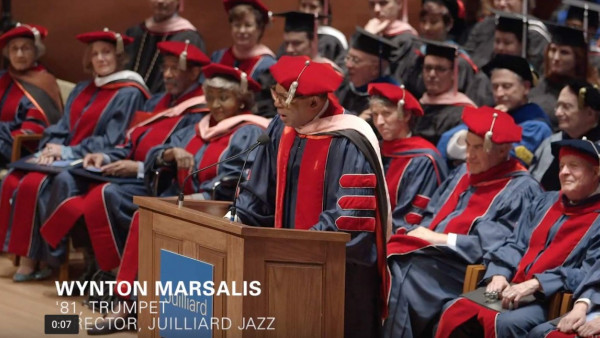Juilliard: An Interview With Wynton Marsalis

The Juilliard Jazz Orchestra celebrates Blue Note Records with a Tully Hall concert on April 3
Founded in 1939, it’s hard to believe that Blue Note Records has been around for nearly 80 years. Synonymous with extraordinary jazz since its inception, the label has produced and/or commissioned albums from an almost endless list of genre titans, including Dexter Gordon, Joe Henderson, Jackie McLean, Woody Shaw, Wayne Shorter, Horace Silver, and McCoy Tyner—all of whom have works that the Jazz Orchestra is scheduled to perform on April 3. Wynton Marsalis (‘81, trumpet), the director of Juilliard Jazz, took a break from his busy schedule to sit down and answer a few questions from first-year trombonist Jasim Perales about the importance of this legendary label and this concert.
First off, what would you like us as students and musicians to come away with and learn from this particular concert and repertoire?
Wynton Marsalis: I would like all of you to learn about the knowledge and the history of jazz, know the jazz continuum, and come away with different ways to improvise. I want you to know the way the musicians played, learn the modern big band language, and use that language and apply it to small-band settings. A lot of these tunes weren’t written for large ensembles, and I want you all to understand that style of playing.
Why did you choose this theme and what is it about Blue Note Records that makes it an interesting concert theme here and now?
Every day is the present day. So it doesn’t matter if it is yesterday, today, or tomorrow, it’s an important body of work, with a great sound, informative linear notes, and legendary cover art. It’s important history to know. I hope you all study the history and do the work outside of the classroom.
What are some of your favorite recordings from this repertoire and how have they influenced you as an artist?
There are so many, I couldn’t name them all. Blue Note started with Sidney Bechet, and the New Orleans style of music. From Sidney Bechet to all of Art Blakey’s music—and I played in his band—his early classic albums. Wayne Shorter, Herbie Hancock, Dexter Gordon, Lee Morgan, Freddie Hubbard—they all covered a lot of music, made a lot possible, and had a lot of creativity. It’s important to learn about them because they shaped the music we hear today.
by Jasim Perales
Source: Juilliard Journal

